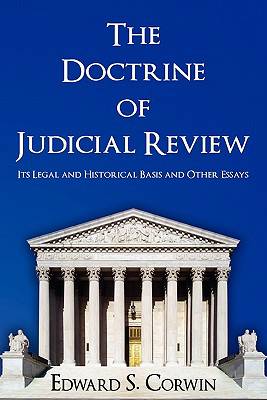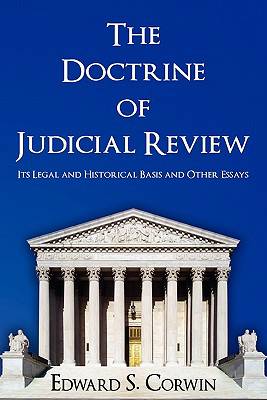
- Afhalen na 1 uur in een winkel met voorraad
- Gratis thuislevering in België vanaf € 30
- Ruim aanbod met 7 miljoen producten
- Afhalen na 1 uur in een winkel met voorraad
- Gratis thuislevering in België vanaf € 30
- Ruim aanbod met 7 miljoen producten
Zoeken
The Doctrine of Judicial Review
Its Legal and Historical Basis and Other Essays
Edward S Corwin
Paperback | Engels
€ 18,45
+ 36 punten
Uitvoering
Omschrijving
Provocative Essays on Judicial Review. This book contains five historical essays, three of them on the concept of "judicial review," which is defined as the power and duty of a court to disregard ultra vires legislative acts. - In "Marbury v. Madison and the Doctrine of Judicial Review," Corwin asks: "What is the exact legal basis of the power of the Supreme Court to pass upon the constitutionality of acts of Congress?" - "We, the People" examines the issues of secession and nullification. - "The Pelatiah Webster Myth" demolishes Hannis Taylor's thesis that Webster was the "secret" author of the United States Constitution. - "The Dred Scott Decision" considers Chief Justice Taney's argument concerning Scott's title to citizenship under the Constitution. - "Some Possibilities in the Way of Treaty-Making" discusses how the US Constitution relates to international treaties. Edward S. Corwin [1878-1963] succeeded Woodrow Wilson as the McCormick Professor of Jurisprudence at Princeton University, and was the first chairman of the Department of Politics. The author of numerous books on constitutional law, he is best known for The Constitution and What It Means Today (1920). He was the president of the American Political Science Association, winner of the American Philosophical Society's Franklin Medal and Phillips Prize and was among the notable scholars acknowledged at the Harvard Tercentenary. In 1952, Princeton's Woodrow Wilson Hall was renamed Edward S. Corwin Hall.
Specificaties
Betrokkenen
- Auteur(s):
- Uitgeverij:
Inhoud
- Aantal bladzijden:
- 190
- Taal:
- Engels
Eigenschappen
- Productcode (EAN):
- 9781616190804
- Verschijningsdatum:
- 23/05/2011
- Uitvoering:
- Paperback
- Formaat:
- Trade paperback (VS)
- Afmetingen:
- 152 mm x 229 mm
- Gewicht:
- 285 g

Alleen bij Standaard Boekhandel
+ 36 punten op je klantenkaart van Standaard Boekhandel
Beoordelingen
We publiceren alleen reviews die voldoen aan de voorwaarden voor reviews. Bekijk onze voorwaarden voor reviews.











